TRACE YOUR PRODUCTS
K Group is constantly striving to improve the transparency of its purchasing chains. On this website, our customers can find out more about where the products they purchase from K Group stores come from.
Where do mywear t-shirts, Pirkka and K-Menu tuna products, Pirkka Fairtrade roses, and PROF Timber sold in our stores come from? We want to increase the transparency of our purchasing chains by providing information on the origin of our products and their journey to our stores. Choose a product to find out more.
Pirkka Fairtrade rose is one of the most popular Fairtrade products in Finland. Pirkka Fairtrade roses come from certified Kenyan Fairtrade flower farms. Optimal climate and other conditions, timely harvesting, on-site packaging, and well-designed logistics ensure the high quality of the cut roses.
Pirkka Fairtrade roses first appeared in K-food stores in 2006. Today, K-food stores also sell Pirkka Fairtrade spray carnations and floribunda roses. In 2023, K-food stores sold over 2 million bunches of Pirkka Fairtrade roses.
Farmers are paid a guaranteed price and a Fairtrade premium for the products. Fairtrade premiums have been used to build day-care centres, schools and healthcare centres for local communities, as well as housing for workers. In 2023, a total of €318,392 was paid in Fairtrade premiums to the farmers of the Fairtrade flowers sold at K-food stores.
Cut roses can thrive in a vase for up to three weeks if you take good care of them. Roses need plenty of water and thrive in deep water. A freshly cut absorption area – as well as clean tissue that is intact at the base of the stem – ensure unhindered access for water to the conducting tissue in the stem. Roses keep longer when they are not exposed to draughts, heat or direct sunlight.
We ensure social responsibility in our suppliers’ production with third-party audits. Attention is paid to the working conditions in factories and plantations, including occupational safety, salaries, working hours and compliance with the ban on child and forced labour, among other aspects.
Fairtrade audits ensure that working conditions, labour rights, Fairtrade premiums and environmental considerations are in line with the Fairtrade criteria.
The Fairtrade criteria also include requirements related to environmental protection, aimed at promoting the sustainable use of soil and water resources, for example.
On Kenyan flower farms, environmental considerations are promoted in many ways, such as reusing water and using renewable energy sources. Flower farms collect rainwater in pools for irrigation. If necessary, water can also be taken from wells, lakes and rivers.
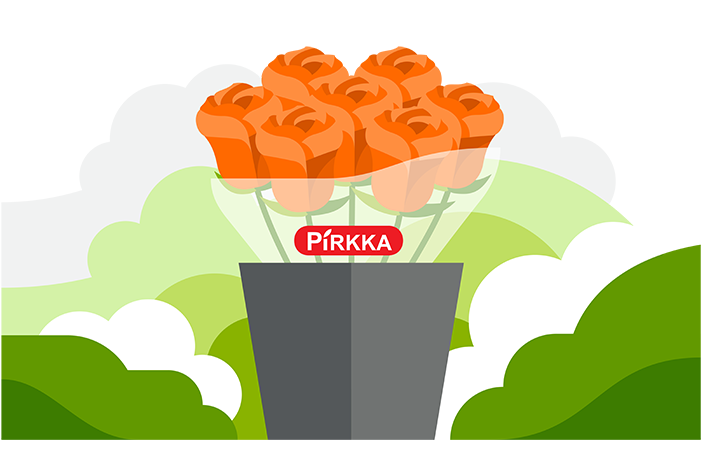
Quality assurance
At K Group’s Quality and Product Development Unit, the laboratory monitors product safety and the quality of the company’s grocery brands and imports. In quality assurance for flowers, attention is paid to outer quality and product labelling, in addition to ensuring that the quality of the flowers remains high all the way to the consumer. During a preservation study, the preservability and shelf life of flowers are checked throughout the chain, from the packaging department in Kenya to the Finnish consumers.
New cleaning products made from used cut-flower buckets
K Group is one of the biggest sellers of flowers in Finland, and as many as 600,000 buckets that are used for cut-flowers accumulate in stores every year. In a collaboration between K Group, Lassila & Tikanoja and Sinituote, the discarded buckets are processed into a raw material that is used to make new cleaning products. The range of SINI cleaning products is available at K-Citymarket and some K-Rauta stores.
Pirkka Fairtrade roses, spray carnations and floribunda roses come from various Kenyan flower farms, such as Nini, Ravine Roses and Penta Flowers. The big Pirkka Parhaat Fairtrade rose sold during the spring comes from Ecuador.
The sunny weather in Kenya is ideal for rose farming throughout the year. Kenya’s location on the equator provides for daily sunshine, with only minor changes in temperature. Kenya also has excellent transport connections.
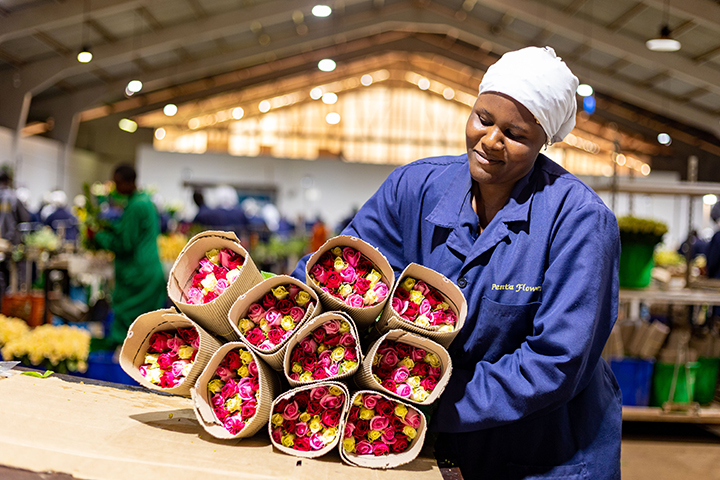
Saumu Nyadzua works at the Penta Flowers farm.
Photo: Fairtrade, Vincent Owino
Many species of roses
When choosing a rose species, attention is paid to the length of the stem, resistance to plant diseases, strength and suitability for the weather conditions in Kenya, as well as yield per square metre. Important selection criteria also include current trends, the beauty of the rose, the flower opening duration and the vase life.
Colours change by the season
The colours of the roses sold at K-food stores are chosen based on customers’ preferences and the season. Cold colours, such as pink, are favoured in the spring. Warm colours, such as orange and yellow, are popular in the autumn, while red and white are Christmas favourites.
The temperature during the transport of Pirkka Fairtrade roses is monitored to ensure high quality. The roses are mainly transported by refrigerated cargo plane from Kenya to the Netherlands. Studies show that despite the flight, the carbon dioxide emissions generated by roses grown in the warm climate of Kenya are around five times smaller than the emissions generated by roses grown in greenhouses in the Netherlands. The protective packaging is removed in the Netherlands, quality is checked and new absorption areas are cut on the roses, which are placed in buckets with water and flower preservative. The roses are transported to Finland in a temperature-controlled truck, which travels from Germany to Finland by ferry. In Finland, the roses are delivered to Kesko’s central warehouse in Vantaa, where they are collected to be included in loads delivered to K-stores. The roses arriving in Finland can be available for customers at stores as early as the next day.
In 2023, a total of €318,392 was paid in Fairtrade premiums to the farmers for the Fairtrade flowers sold at K-food stores. The Fairtrade premium is paid to the producers in addition to the sales price. The local farming community is responsible for the use of the Fairtrade premiums. The funds are intended for the social or economic development of the community.
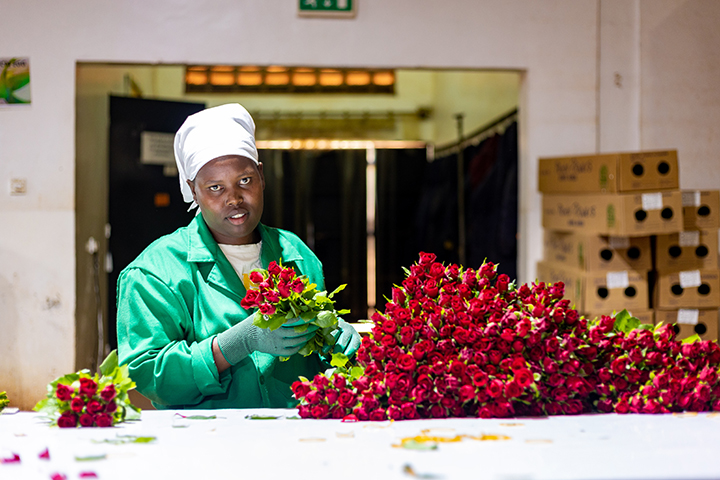
Zipporah Moraa Ombiro is sorting Fairtrade roses into bundles.
Photo: Fairtrade, Vincent Owino
Fairtrade premiums have been used for many purposes on flower farms
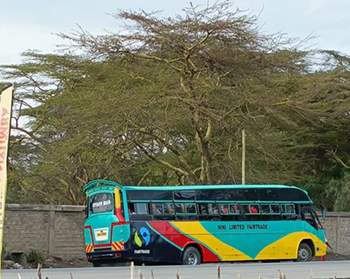
Pirkka Fairtrade roses come from several Fairtrade flower farms in Kenya. We present the three main flower producers below.
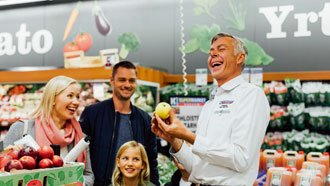
Kesko Corporation is the only company in the world to have been included on the Global 100 Most Sustainable Corporations in the World list by Corporate Knights every year since the list was first established in 2005.
Read more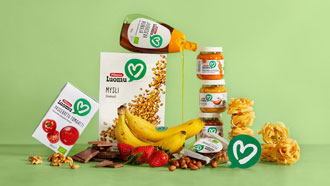
Do you have questions about the origin or qualities of Pirkka products? Contact K Consumer Service by phone on 0800- 0- 1000 or via email at kuluttajapalvelu(at)kesko.fi.
Read more
International Fairtrade began in the 1980s. The first Fairtrade product in the Pirkka range was Pirkka Fairtrade coffee, introduced in 1999.
Read moreWould you like to learn more about another product? See here for the products: